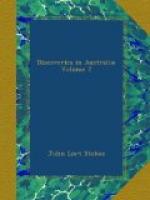(Footnote. My observations refer to this gentleman’s new house, which they place in latitude 38 degrees 20 minutes 45 seconds South and longitude 9 degrees 36 minutes 22 seconds West of Sydney, by satisfactory meridian distances to the latter place, and from South Australia. Preferring Mr. Tyers’ difference of longitude by triangulation to the east entrance point of the Glenelg River, 37 minutes 29 seconds, which is 1 minute 27 seconds more than his chronometric measurement; the mouth of the Glenelg will be 10 degrees 13 minutes 51 seconds West of Sydney. By Mr. Tyers’ triangulation, calculated by Captain Owen Stanley from Port Phillip, Batman’s Hill, with my longitude of the latter 6 degrees 16 minutes 17 seconds West of Sydney, the Glenelg is West of Sydney 10 degrees 14 minutes 02 seconds, which is 57 seconds less than Mr. Tyers’ calculation. The longitude of Sydney, by different observers, ranges between 151 degrees 12 minutes 0 seconds and 151 degrees 17 minutes 0 seconds; but, as I myself believe 151 degrees 16 minutes to be within a minute of the truth, the Glenelg will, accordingly, by my observations be in 141 degrees 02 minutes 09 seconds East and therefore within the New South Wales territory, the limit of which it had been supposed to mark. If the 141st degree had been selected as the boundary of the colony, with reference to the longitude of Sydney, there would not be much difficulty attending its determination.)
(**Footnote. The squatter, who often at great risk locates himself in a remote spot, and renders such essential service to the mother country by finding new lands, yea new homes, for the surplus population, merits much greater encouragement than he receives, particularly in instances similar to that of Mr. Henty, whose station at Portland was, for years, hundreds of miles removed from other occupied parts. This gentleman’s case makes it clear at once that something ought to be done for the squatter. His comfortable house and garden he was obliged to leave to make room for a street of the new township; but this would not have been very hard had he been given an allotment in lieu; which, however, as I have stated, was not done; and he was compelled to witness the labour of his hands entirely swept away, and found himself, after years of toil, placed exactly in the same position with those who came to enjoy the fruits of his enterprise.
But the greatest hardship sustained by the squatter is the Special Survey system, according to which, anyone desirous to become a purchaser to the extent of twenty thousand acres may choose his land where he pleases. A party clubs together and finds out spots, that have been improved by squatters, with a view of purchasing them when able; many of these are often included in one special survey block: and even if the squatter is able to purchase the rich and hardly-won small patch he occupies, the special survey party, generally a knot of jobbers, have the




